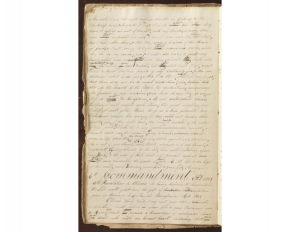Historical Context and Background of D&C 8

Video Overview
Brief Synopsis by Steven C. Harper
The Lord told Oliver he could translate ancient records in section 6, then showed him an ancient record in section 7. Joseph said Oliver “became exceedingly anxious to have the power to translate bestowed upon him,” so Joseph asked the Lord and received section 8.1
In the revelation the Lord told Oliver the conditions on which he would be able to translate. He would have to seek the necessary knowledge honestly, in faith, believing in the Lord’s promise. The Lord, in turn, would tell Oliver this knowledge in his heart by the power of the Holy Ghost. This spirit of revelation guided Moses in leading the children of Israel safely through the Red Sea. It was now Oliver’s gift. “Apply unto it” (D&C 8:4), the Lord commanded him.
The Lord also reminded Oliver of his other gift, the gift possessed by Moses’s brother Aaron—the gift of working with a divining rod, or, as the earliest extant manuscript of this revelation puts it, “the gift of working with the sprout.”2 It had already told Oliver many things and may be what the Lord alluded to in D&C 6:11–12. The Lord affirms and validates this gift and commands Oliver not to trifle with the gift or ask for things that he ought not.
So what should he ask for? He should ask to know the mysteries of God. He should ask to translate and receive knowledge from ancient records that have been kept hidden. The Lord would grant these desires according to Oliver’s faith, just as he had done all along.
Means of revelation, including Oliver’s rod, Lehi’s “miraculous directors,” and Joseph’s seer stones (or the brother of Jared’s) were apparently much more common anciently and in Joseph’s day than in ours (D&C 17:1). By 1829, when this revelation was given, such gifts were being questioned. Skepticism of “means,” as the scriptures call supernatural gifts, was beginning to be explained in naturalistic terms instead.3
Before publishing this revelation in the 1835 Doctrine and Covenants, Joseph took out the explicit mention of Oliver’s rod and referred to it vaguely to “the gift of Aaron” (D&C 8:6). This revelation neither denied nor discouraged either of Oliver’s gifts, however. As commanded, Oliver did not trifle with his rod or make it known to unbelievers (D&C 6:11). Little is known about it in our naturalistic culture. Perhaps the equally marvelous, supernal gift of the Holy Ghost remains nearly as mysterious. It is widely available, yet few “apply unto it” as the revelation commands (D&C 8:4).
1. “History, 1838–1856, volume A-1 [23 December 1805–30 August 1834],” p. 16, The Joseph Smith Papers, accessed July 22, 2020.
2. “Revelation, April 1829–B [D&C 8],” p. 13, The Joseph Smith Papers, accessed July 22, 2020. Richard L. Bushman, Joseph Smith: Rough Stone Rolling (New York: Knopf, 2005), 73. Robert J. Woodford, “Historical Development of the Doctrine and Covenants,” (Brigham Young University, PhD dissertation, 1974): 185–89.
3. See all of Alma 37. Also 1 Nephi 16:29, Mosiah 8:15–18, D&C 10:1, Joseph Smith—History 1:62.
Additional Context by Casey Paul Griffiths
From Doctrine and Covenants Minute
In his history Joseph Smith records, “Whilst continuing the work of translation during the month of April; Oliver Cowdery became exceedingly anxious to have the power to translate bestowed upon him” (History, 1838–1856, vol. A-1, 16). Earlier, the Lord told Oliver in revelation that “I grant unto you a gift, if thou desire of me, to translate, even as my servant Joseph” (D&C 6:25). Seeing Oliver’s desire to translate, Joseph inquired of the Lord and received the revelation recorded in section 8. This revelation and Doctrine and Covenants 6, 7, and 9 were all received around the same time. While in every published version of the Doctrine and Covenants the revelation in section 8 has been placed after the revelation about John the Beloved, there is some question of when it was received. In the earliest compilation, John Whitmer, the first Church historian, placed this revelation before Doctrine and Covenants 7 (Revelation Book 1, 12, JSP). Regardless of when it was received, Doctrine and Covenants 8 is another crucial stepping-stone in Oliver’s introduction to the process of receiving revelation from God.
See Historical Introduction, “Revelation, April 1829–B [D&C 8],” p. 12, The Joseph Smith Papers, accessed September 24, 2020, https://www.josephsmithpapers.org/paper-summary/revelation-april-1829-b-dc-8/1
